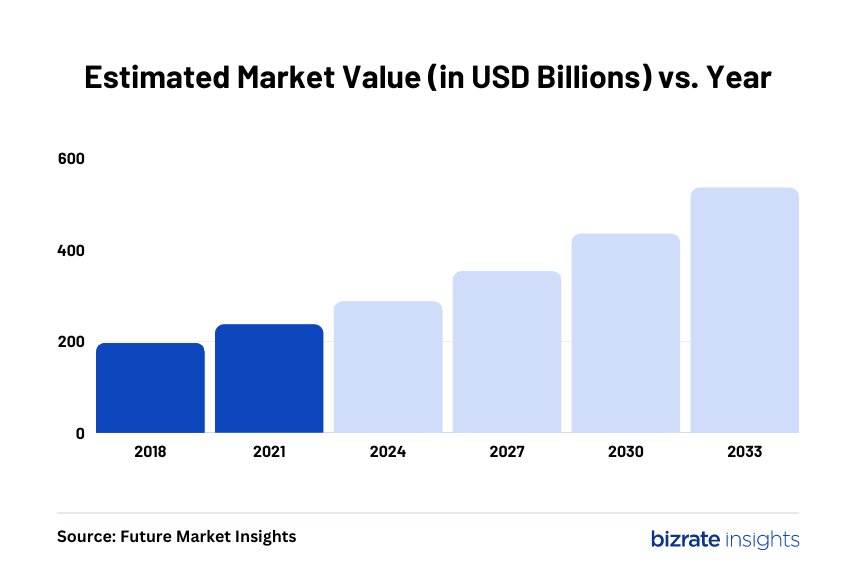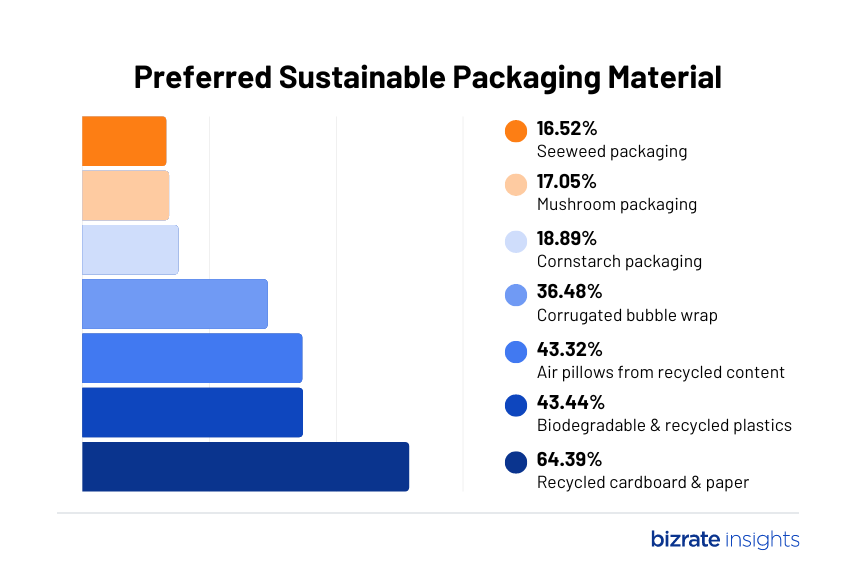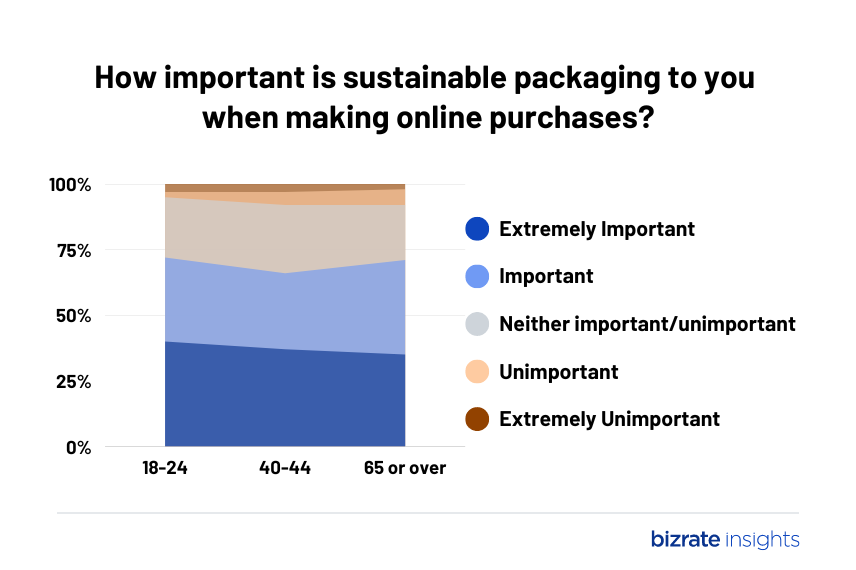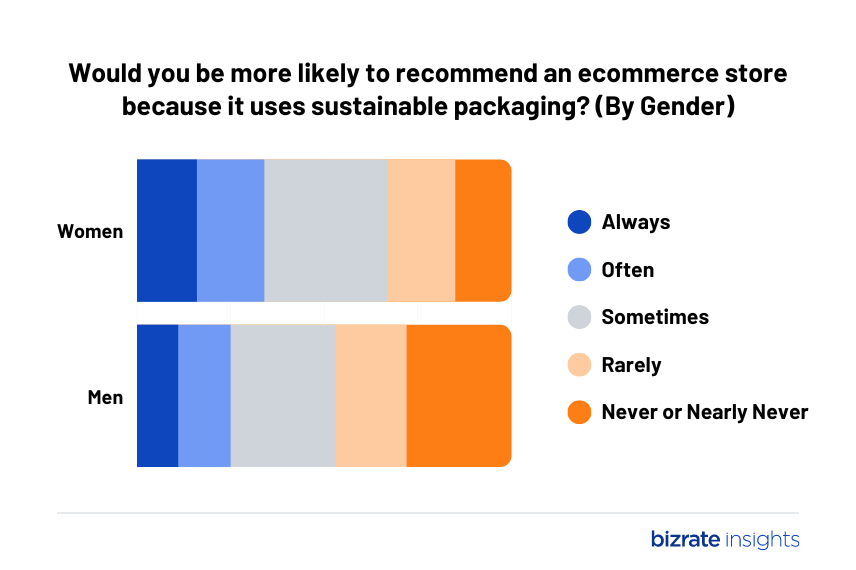Bizrate Insights· Author
In a summer of fires in Hawaii and floods in Southern California, extreme weather has been a big part of the news cycle. As consumers become increasingly aware of climate change and mounting waste issues, sustainable packaging is becoming a significant consideration for consumers. In a recent survey conducted with 1000 verified online shoppers, we gained insights into their thoughts on sustainable packaging and how it influences their online shopping decisions.
Ecommerce Shifts to Sustainable Packaging
Over the last few years, there has been a pronounced shift in consumer attitudes towards sustainable packaging. More and more people have started to see the value in reducing their impact on the environment.. According to Future Market Insights, the sustainable packaging market is projected to achieve a value of $266.4 billion in 2023, and surpass $533.9 billion by 2033. Major companies are making the shift – Walmart expects to be using sustainable packaging exclusively by 2025.

Breaking Down Consumer Preference
When considering the type of sustainable packaging, respondents showed a diverse range of preferences:
Recycled cardboard and paper led the pack with a whopping 61.90%.
Biodegradable packaging peanuts and air pillows made from recycled content were also popular, garnering 46.49% and 41.65% respectively.
Innovative alternatives such as mushroom packaging (16.39%) and seaweed packaging (15.88%) also found a place, albeit with lower percentages.

Consumer Packaging Expectations
A resounding 80.76% of respondents believe that ecommerce businesses have a responsibility to reduce packaging waste. And, there’s a growing number of consumers willing to take action based on that belief. These customers are definable by age: Our research shows that younger individuals (between 18-29) are more likely not to purchase from a company due to their non-sustainable packaging. Nearly ⅓ of all those 35 and younger have skipped a purchase because of lack of sustainable packaging. This number gradually decreases as age increases, with only 15% of those aged 60-64 sharing the sentiment.
Investors are also considering environmental impact when choosing a company. One-quarter of all funds under management in the U.S. are ESG-rated funds – upwards of $12 trillion. (Environmental, social and governance – ESG – is a framework used to assess an organization’s business practices and performance on sustainability and ethical issues.)

Gender and Sustainable Packaging
Our survey yielded some gender-based insights:
Women were more inclined to recommend an ecommerce store if it uses sustainable packaging, with 67% taking this stance compared to just 53% of men.
On the question of waiting longer for deliveries to reduce packaging waste, 14% of women were always or nearly always willing compared to 11% of men.

Companies Crushing It in Sustainable Packaging
Leading companies have embraced the sustainable model and have woven this message into their marketing. Puma worked with Fuseproject to come up with more sustainable packaging for their shoes. Gucci redesigned its bags to communicate luxury while also being 100% recyclable. Calvin Klein has committed to fully recyclable packaging by the year 2023. Lush packaging is 90% made from recycled materials. Kellogg’s packaging is 76% recyclable, and they’re committed to reaching 100% by 2025.

Rethinking Ecommerce Packaging
Packaging needs to be part of your ecommerce strategy. How you package your products signals your values to the market.
For brands looking to cement their place in the hearts of consumers, understanding the importance of sustainable packaging can’t be overlooked. Whether it’s tailoring packaging based on demographic insights or adjusting strategies to current eco-trends, the data indicates one thing: Sustainable packaging is not just an eco-friendly move; it’s a business imperative.
Ask Your Own Customers
From these numbers, it would seem the push towards sustainable packaging in ecommerce is not a mere trend; it’s a demand driven by conscious consumers. That said, to learn what your customers think about your packaging practices (and a whole lot more), the best solution is to ask them.
Bizrate Insights has the perfect answer with our Fulfillment Survey. This survey arrives to your customers via their inbox at the expected date of delivery, and guides them through a series of questions about their delivery experience. By implementing this solution you’ll learn insights unique to your customers and their experience. And you can implement our Voice-of-Consumer solutions at no cost to you, the merchant.
Reach out today and learn more about our Customer Feedback solutions.
